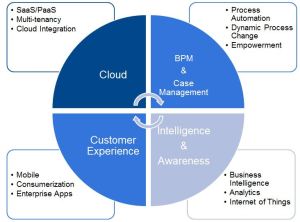Peter Whibley
14.00

Intelligent Process Applications
This blog will be about the future of business process, what I refer to as Intelligent Process Applications.
Both Gartner and Forrester have different opinions about the future of BPM and Case Management. Gartner have proposed iBPMS (intelligent Business Process Management Suites) while Forrester have proposed Smart Process Applications. So who’s right? Well in my opinion both are half right. It’s obviously true, as Gartner propose that future business processes will be deployed with more intelligence built-in. It’s also true however that as a consequence of mobility and the consumerization of IT we are moving businesses to an era of on demand business process applications as envisaged by Forrester.
However, as you would expect, both Gartner and Forrester have played a bit to their customer base and in my opinion have given emphasis to features and functionality that while important are really only a subset of greater industry themes. Rather than iBPMS or Smart Process Applications I think the term Intelligent Process Applications is a better description of where the business process management and case management market is headed.
Future Intelligent Process Applications will have four key components (I’ll discuss these in more detail in future posts):
1. BPM and Case Management
They’ll be underpinned by a BPM and Case Management applications that act as the engine for process automation and employee empowerment. While some business process apps will be rigid and inflexible others will exhibit flexibility with more case management like characteristics and empower participants to adjust processes rapidly in response to changing business and market demands.
2. Intelligence and Awareness
They’ll possess intelligence. By intelligence however we are really talking about awareness. Using business intelligence, data, content, social and predictive analytics as well as integration with smart devices intelligence and awareness functionality will be used to alert businesses and employees to key changes in their environment.
3. Customer Experience
Yes mobility is a crucial capability but it is only a subset of a more important theme, customer experience. Our personal technology experience has changed our business IT expectations. The app. internet model we have become familiar with in our personal lives is starting to take hold in business, changing not only how enterprises acquire business applications but also how they design and execute their business processes. Mobile capabilities will be crucial to the success of future process apps but only if they are designed with customer experience in mind.
4. Cloud
The delivery vehicle for intelligent process applications will be via a multi-tenant cloud architecture. The greatest challenge for process app vendors will be to bring the speed and simplicity of the app experience to multi-application process solutions.
Is this too simplistic? Have I missed something? Will social play a bigger role? I’d love to get your opinion.
Like this:
Like Loading...

